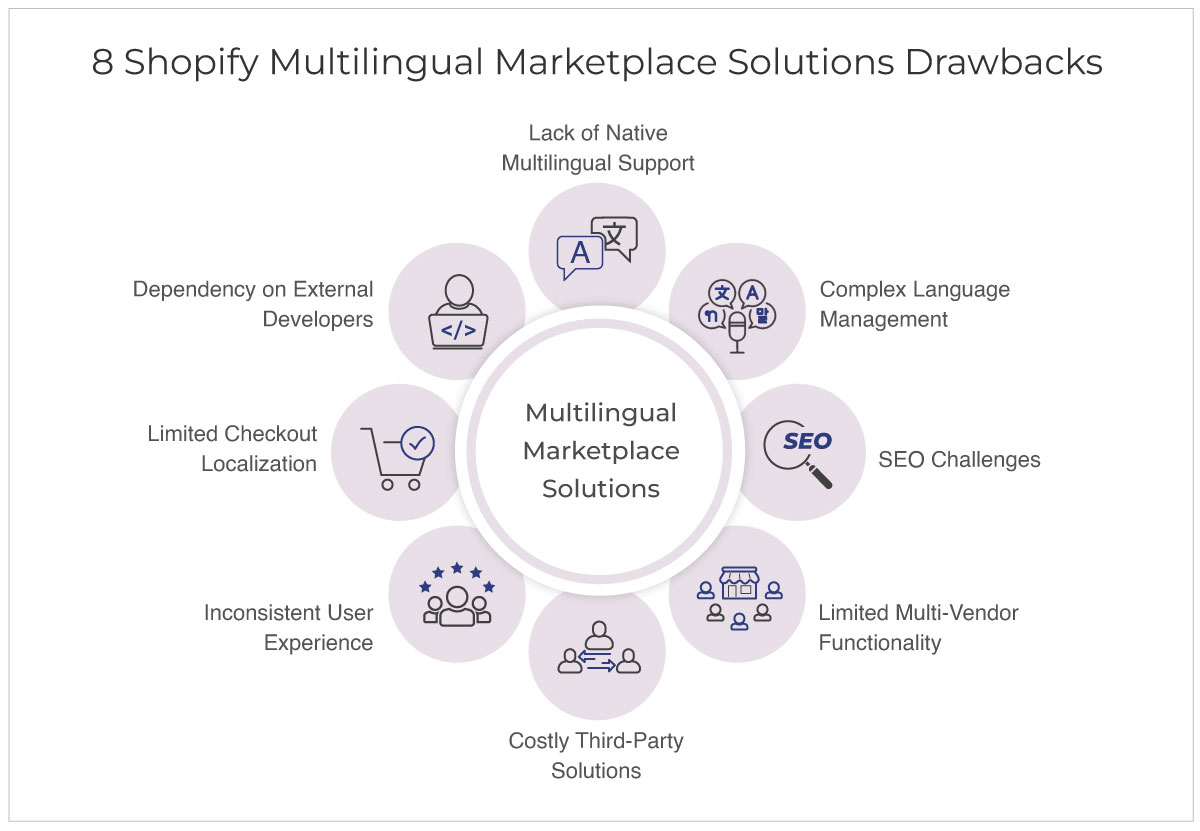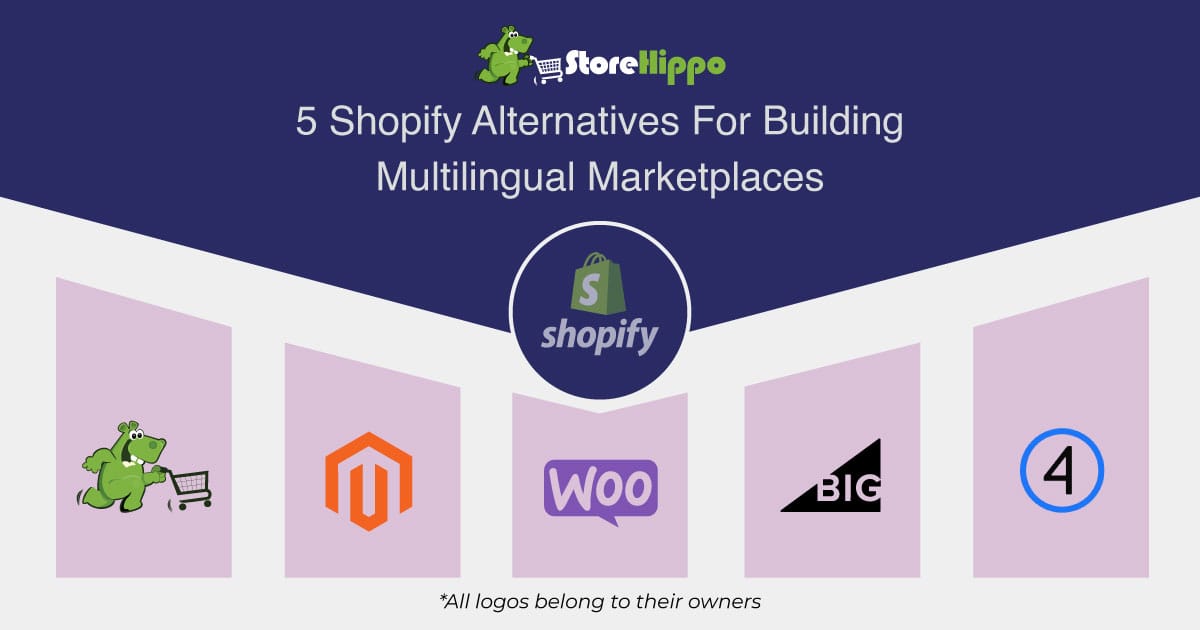In today's fast-paced eCommerce world, finding the right Shopify alternatives for a multilingual marketplace is more crucial than ever. Especially in a culturally rich and diverse market like India, businesses need a solution that can effortlessly connect with customers in multiple languages.
While Shopify has made a name for itself, it falls short when it comes to offering seamless support for a multilingual and multi-vendor marketplace platform. This gap has led businesses to explore more robust Shopify multilingual alternatives to build their successful brand marketplaces.
In this blog, we'll dive into five top options—StoreHippo, BigCommerce, Magento, WooCommerce, and Shift4Shop. We’ll compare their capabilities in handling the complexities of multilingual marketplace setups and other essential enterprise features, helping you find the perfect fit for your business needs.
Let's begin by understanding the key issues with Shopify multilingual marketplace solutions.
Table of Contents
8 Problems of Building A Multilingual Marketplace In India With Shopify
While building a multilingual marketplace in India with Shopify might seem like a good option, you might run into a few roadblocks.

Here are 8 issues that make Shopify a difficult option for building a multilingual marketplace for Indian customers:
- Lack of Native Multilingual Support: Shopify does not offer built-in multilingual capabilities, requiring businesses to rely on third-party apps to add and manage multiple languages, complicating the setup process.
- Complex Language Management: Managing content in multiple languages through third-party apps can be cumbersome and less intuitive, leading to difficulties in maintaining consistency and quality across different language versions forcing enterprises to look for Shopify multilingual alternatives.
- SEO Challenges: Implementing multiple languages using third-party apps can result in suboptimal URL structures and SEO practices, potentially affecting the marketplace's visibility in search engines and reducing organic traffic.
- Limited Multi-Vendor Functionality: Shopify lacks robust native multi-vendor marketplace features, requiring additional apps or custom development to create a fully functional marketplace, which can be both costly and time-consuming.
- Costly Third-Party Solutions: The need for third-party apps to add multilingual and multi-vendor features increases the overall cost, making it an expensive option for businesses looking to cater to a multilingual Indian audience by building a multi vendor marketplace platform.
- Inconsistent User Experience: Integrating multiple apps for languages and marketplace features can lead to an inconsistent user experience, with potential issues in navigation, checkout processes, and language switching, which may deter customers.
- Limited Checkout Localization: Shopify's checkout process has limited localization options, especially for languages other than English, making it challenging to provide a seamless and localized experience for regional Indic language buyers.
- Dependency on External Developers: Customizing Shopify for a multilingual marketplace often requires hiring external developers, adding to the complexity and increasing the time needed to launch and manage the multi vendor marketplace efficiently.
With these complexities in building a seamless marketplace website, Indian enterprises are often compelled to look for the best Shopify multilingual alternatives to build a successful marketplace.
Top 5 Shopify Alternatives for Building Multilingual Marketplaces For India Enterprises
Struggling to build a multilingual marketplace with Shopify? We've got you covered with the top 5 alternatives that offer the robust multilingual and multi-vendor features you need.
1. StoreHippo

StoreHippo is a SaaS-based eCommerce platform designed with a focus on multilingual and multi-vendor marketplaces. Compared to some Shopify alternatives, it offers advanced solutions for businesses aiming for global reach. As one of the best Shopify multilingual alternatives, StoreHippo provides tools to manage various languages and vendors, making it a suitable option for those needing a multi-vendor marketplace platform that supports complex multilingual operations.
Pros:
- Offers extensive multilingual support with over 100 languages, including RTL languages like Arabic and Hebrew, seamlessly integrating into themes and static content without additional apps.
- Provides both automatic and manual translation options, allowing hassle-free automatic translations and the flexibility to manually override for accuracy and localization.
- Automatically detects customer location through IP-based language detection, displaying the website in the preferred language to enhance user experience making it the best Shopify multilingual alternatives.
- Allows the setup of multiple storefronts with dedicated languages, offering a truly localized shopping experience tailored to different regions.
- Enables adding multiple languages to mobile apps, ensuring language consistency across all customer touchpoints and maintaining a unified brand experience.
- Includes a built-in multi-vendor solution with automated vendor management, commission tracking, and payout options, reducing the need for external plugins.
- Supports bulk translations of core entities through CSV files, saving time and effort in managing multilingual content efficiently making it a superior Shopify multilingual alternative.
- Allows language customization of the admin dashboard and seller panel, offering a tailored experience for sellers and distributors, enhancing overall marketplace management.
- Full support for multi currency payments and a tax engine to handle different taxations
- 300+ built in enterprise grade features
- Seamless integrations with third party apps and service providers with APIs.
Cons:
- Advance features and customizations are available only with higher plans
- Since it has full support for full front end UX/UIcustomizations it Does not offer
2. BigCommerce

BigCommerce is an eCommerce platform known for its scalability and flexibility, making it a solid choice among Shopify alternatives for businesses seeking to build a multilingual marketplace. It supports multiple languages through third-party apps and offers multi-vendor marketplace platform features. While not specifically designed for multilingual setups, it provides the necessary tools to manage various regions, offering a solution for enterprises looking to expand their global presence.
Pros:
- Has features to manage multiple sites in different languages from a single dashboard, streamlining international operations making it a good Shopify multilingual alternative.
- Integrates with various tools for automatic currency conversion based on the customer's location, enhancing the shopping experience.
- Seamless integration with third-party marketplace apps.
- Provides a centralized dashboard to manage multiple vendors, making it easier to oversee product listings, inventory, and order processing from different sellers.
- Offers SEO tools optimized for multilingual content.
- Provides a wide range of tools and integrations to support global commerce for brands .
- Offers robust API support for custom integrations, enabling a more tailored eCommerce solution.
Cons:
- Lacks native multi vendor marketplace capabilities, requiring third-party apps to create a fully functional multi-vendor setup, which can add to the overall complexity and cost making it a costly Shopify alternative.
- Relies on third-party apps for comprehensive multilingual support, which may lead to increased expenses and potential compatibility issues when managing multiple languages rendering it as a complex Shopify multilingual alternative.
- Customizing the platform to suit specific multilingual needs can be time-consuming and may require advanced technical knowledge, making it less accessible for businesses without in-house expertise.
- SEO tools, while useful, may require manual adjustments for different languages and regions, adding to the workload for maintaining optimal search engine performance.
- Managing multiple languages and vendors can become complex and may require significant resources to maintain efficiently, potentially leading to higher operational costs over time and thus not the optimal Shopify alternative for a multilingual marketplace.
3. Magento

Magento is a powerful and highly customizable eCommerce platform, often considered one of the best Shopify multilingual alternatives. It natively supports multiple languages and currencies, which can be advantageous for businesses looking to create a comprehensive multilingual and multi-vendor marketplace. Magento’s open-source nature allows for extensive customization, although it may require technical expertise to fully leverage its capabilities for a global marketplace.
Pros:
- Provides a wide range of language packs for seamless integration, covering various languages and regions making it a good Shopify multilingual alternative.
- Allows setting up different store views for each language, enabling businesses to customize the shopping experience for each market.
- Offers geo-targeting options to deliver region-specific content, enhancing the localization aspect of the marketplace.
- Offers granular control over every aspect of the marketplace store, from layout to functionality, making it highly customizable.
- A large developer community and extensive documentation provide support for complex multilingual implementations.
- Offers a wide range of vendor management features, including product approval workflows, seller-specific dashboards, and detailed analytics.
- Open-source nature allows for extensive customization of marketplace features to create a tailored multi vendor marketplace platform.
Cons:
- Setting up a multilingual marketplace requires technical expertise and a longer development timeline, making it less accessible for businesses without in-house developers.
- Customizing and maintaining a multilingual marketplace on Magento can be expensive due to the need for specialized developers and hosting requirements making a less popular Shopify alternative for multilingual marketplace.
- Advanced multilingual features need premium extensions, which can add to complexity and costs.
- Running a Magento-based multilingual marketplace requires significant server resources which escalate hosting costs, especially for large marketplaces.
- Optimizing multilingual content for SEO requires manual adjustments, increasing the workload for maintaining good search engine rankings across different languages and hence rendering Magento as not the best Shopify alternative for multilingual marketplaces.
4. WooCommerce

WooCommerce, a WordPress plugin, offers a versatile approach for businesses looking to create a multilingual marketplace. As one of the more cost-effective Shopify alternatives, it supports multiple languages through plugins like WPML. While WooCommerce doesn’t natively provide multi-vendor marketplace platform features, third-party extensions like Dokan or WC Vendors can be integrated to build a marketplace with various vendors, making it a flexible option for smaller enterprises.
Pros:
- Seamlessly integrates with WPML (WordPress Multilingual Plugin), providing an easy way to translate content, products, and categories.
- Supports localized payment options, enhancing the shopping experience for international customers.
- Offers customizable language switchers, allowing customers to easily change the language preference on the site which makes it a preferred Shopify alternative for multilingual marketplace websites.
- Ideal for WordPress users, with an intuitive interface for managing products and orders in multiple languages.
- A wide range of plugins for additional functionality, including language-specific SEO optimization.
Cons:
- Heavy dependence on third-party plugins like WPML for multilingual support can lead to compatibility issues and increased maintenance making it not an ideal multilingual Shopify alternative.
- Managing a large multilingual marketplace with WooCommerce can become cumbersome and slow as the number of products and languages increases.
- Setting up a multi-vendor marketplace with WooCommerce requires multiple plugins, complicating the setup and increasing the potential for conflicts.
- Adding multilingual and multi-vendor plugins can negatively impact website performance, leading to slower load times and a poorer user experience and thus beating the purpose of migrating to a Shopify alternative for multilingual marketplace.
- WooCommerce and its associated plugins require regular updates to maintain security and functionality, which can be time-consuming and risk compatibility issues.
5. Shift4Shop

Shift4Shop provides an all-in-one eCommerce solution with basic multilingual support, making it one of the Shopify alternatives for multilingual marketplaces. It offers built-in tools to manage content in different languages and supports multi-vendor marketplace functionalities through add-ons. Although its multilingual capabilities are not as advanced as some other platforms, Shift4Shop can be a straightforward option for businesses that need a more simplified approach to managing a global marketplace.
Pros:
- Offers built-in tools for basic multilingual support, allowing businesses to manage content in different languages without needing extensive third-party integrations making it a better Shopify alternative than Magento and WooCommerce.
- Provides multiple currency options, enhancing the shopping experience for an international audience by offering localized pricing, which is essential for a multilingual marketplace.
- Straightforward user-friendly interface makes it easier for businesses to set up and manage a multilingual and multi-vendor marketplace even if they lack advanced technical expertise.
- Includes SEO tools to help optimize multilingual content, aiding in better search engine rankings across different languages and regions.
- Offers a variety of integrated payment gateways supporting transactions in multiple currencies, facilitating seamless payments and providing a better shopping experience in a multi vendor marketplace platform.
Cons:
- Lacks advanced multilingual features such as automatic language detection and seamless language switching, limiting the user experience in a fully integrated multilingual setup.
- Does not provide native multi vendor marketplace features, requiring additional plugins or custom development to create a fully functional marketplace with multiple vendors.
- Requires manual setup and maintenance of different languages, which can be time-consuming and result in inconsistencies in content across various languages.
- For enhanced multilingual and multi-vendor functionalities, businesses need to rely on third-party apps, which can add to costs and create potential compatibility issues thus negating the benefits of replatforming to a Shopify alternative for multilingual marketplace.
- Offers fewer vendor management features compared to other platforms, making it challenging to efficiently handle vendor onboarding, commission structures, and order processing in a multi-vendor environment.
Conclusion
While Shopify is a popular platform for standard eCommerce, it falls short for businesses aiming to build a truly multilingual marketplace with multi-vendor capabilities. For enterprises that require advanced multilingual support, seamless vendor management, and extensive customization, StoreHippo stands out as the best Shopify alternative for multilingual marketplaces. StoreHippo provides an all-in-one solution with built-in features specifically designed to handle the complexities of managing a multilingual and multi-vendor marketplace, making it an excellent choice for Indian businesses looking to reach diverse markets.
If you're seeking a platform that offers centralized control, robust multilingual and multi-vendor functionalities, and supports global expansion with ease, StoreHippo could be the ideal solution. It provides the tools and flexibility needed to cater to a varied customer base, ensuring a seamless shopping experience across different languages and regions.
Ready to elevate your multilingual marketplace with a superior Shopify alternative? Explore StoreHippo’s comprehensive solutions and take advantage of their 14-day free trial to get started today!


